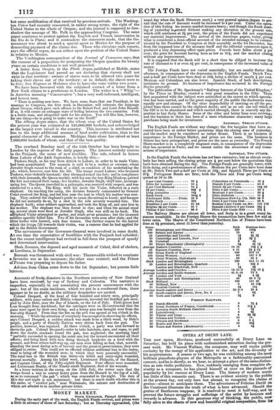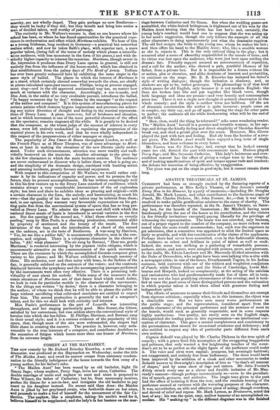OPERA AT DRURY LANE.
THE new opera, Maritana, produced successfully at Drury Lane on. Saturday, has held its place with undiminished attraction during the pre- sent week. Mr. Vincent Wallace, the composer, may well excite public curiosity by the energy of his application to the art, and the diversity of his acquirements. A season or two ago, he was exhibiting among the most brilliant pianoforte-players of the Metropolis at a fashionably-patronized concert; andhe is shortly, as we hear, to attempt a place of the same distinc- tion as solo violin performer. Now, suddenly emerging from complete ob- scurity as a composer, he has placed himself at once on the pinnacle of popularity by his success at Drury Lane. The history of modern musio has little of this romantic cast. There is an evident anxiety in the public at the present day, not only here but abroad, to recognize the claims of genius—almost to anticipate them. The adventures of Felicien David on the Continent illustrate the truth of what is here advanced. Should the genius of Beethoven reappear, it is resolved to meet it half-way, and to prevent the future struggles and sufferings of the artist by honours and rewards in advance. In this generous way of thinking, the public, now' fully alive to the charm of new and beautiful original composition, from its-
scarcity, are not wholly duped. They gain perhaps no new Beethoven— they would be lucky if they did; but they benefit and bring into notice a man of decided talent, well worthy of patronage.
The curiosity in Mr. Wallace's success is, that no one knows where his school has been, or where he has found opportunities for the practical expe- rience in orchestration and effect which Maritana exhibits. We hear of him as a young Irishman, long resident in Germany—a practical but somewhat recluse artist; and now he takes Balfe's place, with superior tact, a more popular talent, (being full of the turns of melody which please a miscella- Mous audience, with less monotony in the form of his pieces,) and with de- s eidedly higher capacity to interest the musician. Maritana, though newer in tie impression it produces than Drury Lane operas in general, is still not entirely free from the influence of the house-model, which has obtained in that establishment from the palmy days of The Maid of Artois. Tedium has ever been greatly enhanced here by exhibiting the same singer in the same style of ballad. The places in which the interest of Maritana is at a stand, which certainly abound somewhat towards the close, are chiefly in pieces calculated upon past successes. Phillips, being at present engaged, must sing—and in the old approved sentimental way too, no matter how much at variance with the character. Accordingly, a cue is made, and Don Jose, in the midst of no very creditable pursuit, introduces the ballad, "In happy moments day by day," written by the manager "at the request of the author and composer." It is this system of manufacturing pieces for certain palates which restores bygone impressions and prevents our achiev- ing any entire diversion of thought and feeling in the musical representa- tions of Drury Lane. A piece, moreover, full of briskness and situation, and in which movement is one of the most powerful elements of the effect on the spectator, remains stagnant all the while. It is greatly to be desired that the composer, as the truest judge of the amount of interest in every scene, were left entirely unshackled in regulating the progression of the musical pieces in his own work, and that he were wholly independent in this respect of the prepossessions of either manager or singer. •
The popularity of Don Ctesar de Baum throughout London, as well at the French Plays as at Minor Theatres, was of some advantage to Mari- tams, at least in making the situations of the new libretto easily under- stood. Under such circumstances, attention was more readily and undi- videdly bestowed on the musician. Another advantage to the piece lay in the few characters in which the main business centres. The audience are never embarrassed to discover who is before them, or what is going on; and the simplicity of the dramatic design, combined with bustling action and amusing incidents, greatly favours musical enjoyment.
With respect to this composition of Mr. Wallace, we would rather esti- mate it by its indications of capacity and power, and its promise for the future, than its present accomplishment. He has written surprisingly well in this his first venture up to the Drury Lane standard of excellence, which contains always a very considerable intermixture of the ad eaptandum style; but here and there he exhibits ideas so pleasing and original—with a certain character in the form, the melody, and harmonizing, so much his own—that the quality of his taste and talent may be inferred from them; and, in our opinion, they warrant very favourable expectations on his get- ting quite free from the conventional system of opera that has so long pre- vailed at Drury Lane. We admire the elegance and skill with which the national dance music of Spain is introduced in several varieties in the first act. But the opening of the second act, "Alas! those chimes so sweetly pealing," sung by Miss Poole, is a charming production, commended alike by propriety of sentiment and the beauty of the music. The fine imitations of the bass, and the introduction of a chord of the second on the cadence, are in the taste of Beethoven. A war-song by Harrison, "Yes, let me like a soldier fall," is uncommonly effective, neat in the con- ception, and original. There is a voluptuous character in the chorus of ladies, "Alt! what pleasure." The air sung by Borrani, "Hear me, gentle Maritana," is rendered interesting by the piquant violin oblig,ato, which is uncommonly attractive on the commencement of the quick movement. These are the resources by which the accomplished German composer gives variety to his pieces; and Mr. Wallace exhibited a thorough mastery of them. His orchestra, now and then noisy with brass, in the fashion of the day, is generally subdued on the entrance of the voices; and the contrasts displayed between the symphony and the accompanying passages performed by the instruments were often very effective. There is a promising indi- viduality of cast about his melody. While many of the measures in the comic situations of Maritana are of that dance kind which recall Anber, we look in vain for particular models in the character of the movements. In the things not written "by desire," there is a character belonging to the author; of whom we think that he will be able to please the public at large without sacrificing what cultivated musicians are entitled to expect from him. The second production is generally the test of a composer's talent, and for this we shall look with curiosity and interest.
Miss Poole's performance in the part of Lazarillo was interesting throughout, and her singing particularly good. Miss Romer, the Gitana, satisfied by her correctness, but rose seldom above the conventional style of heroine into which she has fallen. H. Phillips, Harrison, and Borrani, sang in their usual style; and it is a curious evidence of the popularity of this opera, that, though most of the airs were redemanded, the singers had little share in creating the encores. The practice is, however, very unfa- vourable to the true interests of a composer, and contributes doubtless to the sensation of fatigue which besets more than one hearer of Maritana, . from its extreme length.



























 Previous page
Previous page